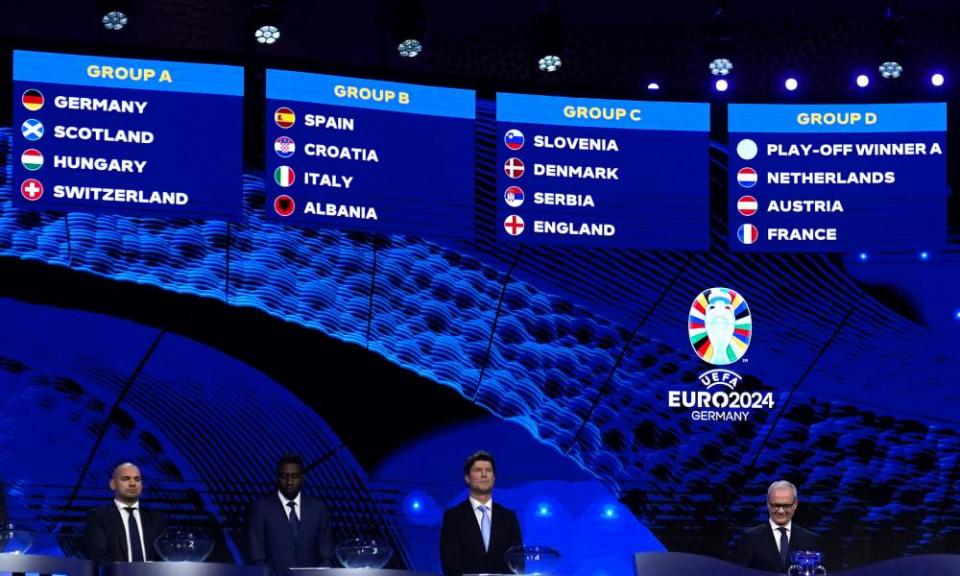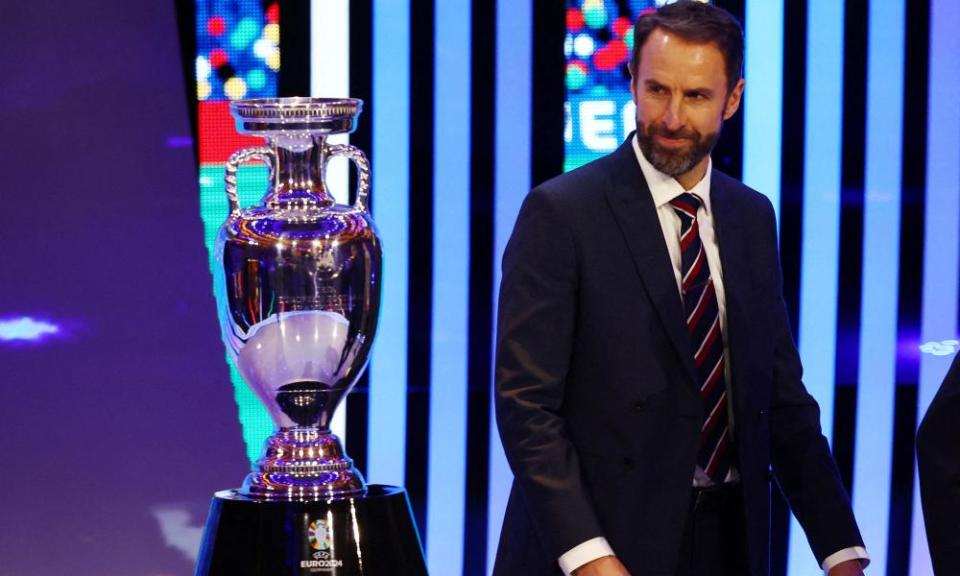Euro 2024: England in group with Denmark; Scotland face Germany opener

Gareth Southgate promised England can handle the pressure of competing to win Euro 2024 after they were dealt an appetising group stage draw against Serbia, Denmark and Slovenia. England avoided trickier-looking foes in the lower-ranked pots and will feel confident of progressing to the round of 16.
The most eyecatching fixture from a British perspective, though, gave Scotland the responsibility of opening the tournament against the host nation Germany on 14 June. That match will take place at Allianz Arena, in Munich; Scotland will also face Hungary and Switzerland in a tight-looking Group A.
Related: Red faces for Uefa as Euro 2024 draw disrupted by ‘pornographic noises’
“We know the expectation at home,” Southgate said after the draw ceremony at the Elbphilharmonie concert hall. “We’ve developed a lot as a team in the last few years, we’re getting used to these big games so we’re ready for that expectation. We hope we can give our supporters some more brilliant nights as I think we have in the last few tournaments.”
Southgate played down suggestions that the draw was relatively soft, even though there was an element of relief at avoiding certain old adversaries. “When Denmark came out first you think ‘OK, interesting’,” he said. “Of course, everyone was thinking about Italy in the lower pots, and Croatia. But I have to say Serbia are a very dangerous opponent and Slovenia takes me back to one of my first games as manager [in October 2016] where, but for Joe Hart plucking out one of the best saves I’ve ever seen, I wouldn’t be standing here.”
England’s Group C campaign will begin on 16 June when they face Serbia in Gelsenkirchen, the venue for their shootout defeat by Portugal in the quarter-finals of the 2006 World Cup. It will be their first meeting with a national team managed by the Yugoslavia legend Dragan Stojkovic. Four days later they will play Denmark at Frankfurt’s Waldstadion, before concluding against Slovenia in Cologne on 25 June.
The Denmark manager, Kasper Hjulmand, wants to exorcise the ghosts of their most recent tie against England, when they were beaten by a controversial Harry Kane penalty at Wembley in the Euro 2020 semi-finals.
“I still wake up at night thinking about that match,” he said. “I think it is something you will always remember and will always carry with you when you are that close to a final. So that one hurts really, really, a lot. We will now see if we can do it better in Frankfurt.”
Stojkovic believes Serbia will be up against potential champions in waiting. “It’s time, you know,” he said. “Everyone is waiting for England to be the champion, World Cup or European Championships, so now maybe it is time to prove that.”
Scotland will lift the curtain on a major competition for the first time since 1998, when they opened the World Cup against Brazil. They will then face Switzerland in Cologne on 19 June before a potentially decisive clash with Hungary in Stuttgart on 23 June. “Nice to open the tournament, nice to be involved in that first game and hopefully we can set the tournament off with a good match,” said their manager, Steve Clarke. “We’ve got to make sure it’s not about the occasion and it’s about the match.
We look forward to it, it’s an exciting draw.”
Clarke will be tasked with landing an early blow to the Germany manager, Julian Nagelsmann, who was forced to make the eight-hour drive to Hamburg after heavy snow cancelled flights from Munich.

Should Wales navigate play-off ties against Finland and either Poland or Estonia in March, they will slot into a demanding Group D alongside France, the Netherlands and Austria. “It looks like one of the toughest groups there,” said the manager, Rob Page. “We’ve got a lot of work to do to get there but the rewards are there.” All of the 12 play-off contenders, who will fight for three spots in the finals, were represented in Hamburg.
The most noteworthy quartet for neutrals pits Italy, the reigning champions, in a mouthwatering Group B with Spain, Croatia and Albania.
Meanwhile if Serhiy Rebrov’s Ukraine team, forced to play all of their games on the road after Russia’s invasion of their country, navigate the playoffs they face a presentable Group E with Belgium, Romania and Slovakia. The other sides hoping to take that berth are Bosnia-Herzegovina, Iceland and Israel.
Download the Guardian app from the iOS App Store on iPhone or the Google Play store on Android by searching for 'The Guardian'.
If you already have the Guardian app, make sure you’re on the most recent version.
In the Guardian app, tap the Menu button at the bottom right, then go to Settings (the gear icon), then Notifications.
Turn on sport notifications.
Group F pits the Euro 2016 winners, Portugal, against Turkey, Czech Republic and whichever of Greece, Georgia, Kazakhstan and Luxembourg navigates the play-offs.
In an unexpected development, the draw was disrupted at several points by what appeared to be pornographic noises. BBC Radio Scotland’s Sportsound programme was prompted to cut out by the scale of the interruption.
“I heard something and putting two and two together I’m assuming there’s some sort of prank going on but I couldn’t really make out what it was,” said Southgate, asked about an embarrassing episode for Uefa.
Earlier on Saturday, a meeting of Uefa’s executive committee at Hamburg’s opulent Hotel Atlantic settled upon a new format for the Women’s Champions League, which will be played in an 18-team league phase followed by knockout rounds from the 2025-26 season onwards, and the creation of a second competition for women’s clubs.

 Yahoo Sport
Yahoo Sport 




































































